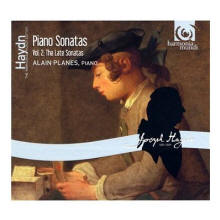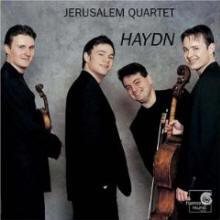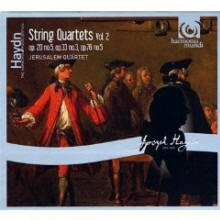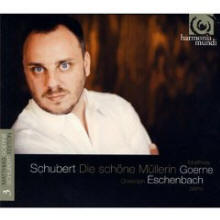|
You are reading the older HTML site Positive Feedback ISSUE 43may/june 2009
Notes of an Amateur -
May 2009, Part 3
Haydn, Vol. 2. The Late Sonatas: nos. 58, 59, 60 & 62. Alain Planès, piano. Harmonia Mundi HMX 2961994. I will listen to anything French pianist Alain Plainès chooses to record. He always pleases, frequently surprises, never disappoints. What initially appear to be new takes on composers end up being revelations. His Schubert is absolutely the most persuasive of any I know. His Debussy was the first I heard that made it clear to me that the composer is of major musical significance and status. His Haydn—and this cycle has been progressing over the past seven years—is the first I've heard that lets me see how various the composer is, even within a single movement of a sonata. Perhaps that is the benefit of recording him over an extended period of time rather all at once. Or of simply valuing him enormously and properly. Planès plays Haydn as if even the composer himself isn't sure of what may be coming along next! It is so fresh, full of the spirit of improvisation, that we forget how ordinary and conventional he can sound in other less intelligent hands. I am fond of Haydn when he is played with less spirit and imagination—he may be our most durable composer. But to hear him fly, dance, pause, and dance again…! What I notice most about these four sonatas is character. It is easy, almost customary, to play Haydn without character, with a great deal of flow, letting it all just skip by painlessly, with more grace than interest. Planès gives each sonata its own musical identity and interest—character. This kind of thing can be overdone, of course. Part of what makes eighteenth century music what it is has to do with formality, not innovation or eccentricity. Striving for a high degree of individuality is a modern—or at least post-classical—value. Planès' Haydn is pure eighteenth century. But within an overall sense of formality and traditional classical decorum, the music speaks to us of highly individual matters. It stops and starts, raises its voice and drops to a whisper, sings and then declaims. We dare not look away for fear of missing something. This is truly musical plenitude. I find Planès' Haydn as irresistible as his Schubert. I know of no other pianist whom I would prefer to hear play either. May he live long enough to play everybody! Planès' earlier recordings of Haydn's sonatas have been reissued in a single 3 CD set, as Harmonia Mundi HMX2961761-63.
Haydn, String Quartets, Jerusalem Quartet. Harmonia Mundi. Opus 64/5; Opus 76/2; and Opus 77/1: HMX 2961823 Opus 20/5; Opus 33/3; and Opus 76/5: HMX 2962030 I have listened to a great many Haydn string quartets performed on ‘period instruments' over the past few years, to the extent that I had forgotten what he sounds like on the modern instruments most of us are used to hearing, especially in concert halls. It is a pity that fashion has driven so much pre-nineteenth century music into the arms of the ‘early music' restoration crowd. I often like what they do with Haydn, but there have been some notoriously unlistenable recordings, notably one by the Salomon Quartet on Hyperion in the early years of the ‘movement.' The Mosaiques and Festetics Quartets do extremely well with him, but it is refreshing to hear him again here on fuller sounding and relatively warmer modern instruments. Harmonia Mundi have a excellent track record in championing first-rate new musicians and ensembles—and it surely did no harm to the Jerusalem Quartet's resume to have Daniel Barenboim lend the group's cellist, Kyril Zlotnikov, Jacqueline Dupre's instrument! As an ensemble, the JQ are bolder and crisper than most modern instrument performers of Haydn, suggesting that they are not striving to achieve a radical alternative to the period instrument sound. Where they differ from the Mosaiques and Festetics is in the greater weight and authority of their presentation. The effect of this quality in their playing is to give the music a larger, more commanding voice. If this suggests the Emerson Quartet, they do, to some extent. The Emersons are equally warm and large but smoother, sweeter, and somewhat less assertive—a bit more Viennese. Clearly, both ensembles seem eager to combat the images of either a kindly or astringent Papa Haydn. I like the Jerusalem's approach and find it, especially in the more recent release containing Opus 20/5, 33/2, and 76/5, drawing me to the music's inherent vigor and energy. This is not to say their Haydn lacks either refinement or elegance, but these qualities are not conspicuous and are not what attract us to the performances. Rather, we feel ourselves conducting and foot-tapping—dancing even, if we are the sort who do that sort of thing to string quartets. What is conspicuous is the group's superb musicianship, which their approach demands. It's easy to play assertive, firm, and loud, a lot harder to do so while maintaining perfect poise, which the JQ does. And their ability to please during the slower, quieter movements without changing their overall approach is where this poise comes to the fore. So if Viennese Haydn is not to your taste and you've had a surfeit of the bitter-sweet textures of period instruments, the Jerusalem Quartet may be just your flagon of ale. Start with the newer album, where I find the ensemble a bit more engaging.
Schubert, Die Schöne Müllerin. Matthias Goerne, baritone. Christoph Eschenbach, piano. Harmonia Mundi. HMC 901995. Few but the mad or deluded, in or out of the world of literature and music, pursue ideal(ized) love any longer, which is a blessing for (mainly) women. But listening to one of the world's most perfect voices sing one of the world's most beautiful musical representations of idealized love reminds us what has been lost for what's been gained. We are back to where we were last time out with the Purcell Fantasias review, looking upon the beauty of melancholy. Maturity, wisdom, and realism make easier lives, leveling the emotional landscape in the interest of good mental health. But they lose us the highs and lows artists and romantics live on. And many of life's colors too. Bringing Matthias Goerne and Schubert together for a series of recitals (this is the third so far) is one those occasions that only exist in a perfect world, probably a perfect European world. I can't imagine a musical business mind in the Western Hemisphere engaging in such an exquisite indulgence. Schubert's Die Schöne Müllerin understands the quest for ideal love perfectly: as a work of art, it dwells at the passionate center of European romanticism. As in all such poems and song cycles, the presence of a ‘miller maid' is as ephemeral and unreal as her attraction to a hunter rather than to the wandering poet is real. The story is not about her but about the beautiful, poignant, myopic melancholy of imagining her as idealized figment and then dying for love of her. "Death is the mother of beauty," poet Wallace Stevens reminds us a century later. I seem to remember saying here not too long ago that Goerne is our Fisher-Diskau. To my ears now, he is better, mainly by virtue of the translucent and mesmerizing impersonality of his voice. Impersonality? It is rich, warm, clear, and firm – but it is also a pure medium for song: nothing seems to stand between us and Schubert's music. At any given moment in a culture there are a few precious, great things going on. Our duty and pleasure is to find them. The Goerne Schubert song series is one of ours. Find it! System used for this audition: Audio Note CDT3 transport and Dac 4.1 Balanced Signature. Blue Circle BC3000II GZpz preamplifer and BC204 hybrid stereo amplifier. Jean Marie Reynaud Orfeo loudspeakers. With Blue Circle BC6000 line conditioner. Audio Note Pallas and Sootto interconnects; Audio Note Lexus speaker cables. Bob Neill, in addition to being an occasional equipment and regular music reviewer for Positive- Feedback Online, is also proprietor of Amherst Audio in Amherst, Massachusetts, which sells equipment from Audio Note, Blue Circle, and JM Reynaud, among others.
|




